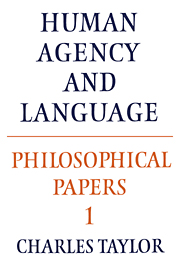2 - Self-interpreting animals
Published online by Cambridge University Press: 05 June 2012
Summary
Human beings are self-interpreting animals. This is a widely echoing theme of contemporary philosophy. It is central to a thesis about the sciences of man, and what differentiates them from the sciences of nature, which passes through Dilthey and is very strong in the late twentieth century. It is one of the basic ideas of Heidegger's philosophy, early and late. Partly through his influence, it has been made the starting point for a new skein of connected conceptions of man, self-understanding and history, of which the most prominent protagonist has been Gadamer. At the same time, this conception of man as self-interpreting has been incorporated into the work of Habermas, the most important successor of the post-Marxist line of thought known somewhat strangely as critical theory.
And one could go on. Through all this cross-talk about ‘hermeneutics’, the question of what one means by this basic thesis, that man is a self-interpreting animal, and how one can show that it is so, may still go unanswered. These are of course tightly related questions; and I would like to try to fumble my way towards an answer to them.
It may turn out to be a mistake, but I am tempted to try to put together the full picture that this thesis means to convey by stages; to lay out, in other words, a series of claims, where the later ones build on the earlier ones, and in that sense form a connected picture.
- Type
- Chapter
- Information
- Philosophical Papers , pp. 45 - 76Publisher: Cambridge University PressPrint publication year: 1985
- 158
- Cited by



